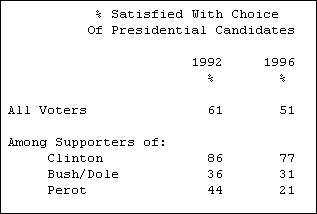Introduction and Summary
Voters were much less pleased with the presidential campaign this year than in 1992. The American electorate was less satisfied with its choice of candidates than in the two previous presidential elections and much more unhappy with the campaign process, particularly compared to 1992. The candidates, the debates, the press, the parties and the poll takers all got lower ratings in the Center’s quadrennial post-election survey. But voters were particularly hard on themselves. Just 39% of respondents felt “the voters” deserved a grade of A or B, down from 61% in 1992 and 49% in 1988.
On a positive note voters felt that they learned enough to make an informed choice between candidates and fewer judged 1996 a mudslinging campaign than 1992. But these favorable developments were offset by complaints that issues were less discussed than four years ago and by greater displeasure with the candidates themselves than in the two previous presidential elections.
The poll of 1,012 respondents conducted Thursday – Sunday, Nov. 7-10, found voters of two minds about the split decision they rendered on election day. A two-thirds majority (65%) was happy that the GOP continued control of the Congress, but only a thin majority (53%) was pleased that Bill Clinton won reelection. In part this is because Republicans and Dole supporters were comparatively more unhappy about Clinton’s win than were Democrats about the outcome of the Congressional elections. Nearly four-in- ten Clinton voters (39%) were pleased to see the GOP maintain control. Even 38% of those who voted for the Democrat from their Congressional district applauded the overall GOP victory. In contrast, only 22% of Republicans and half as many Dole voters (11%) said they are happy Clinton won reelection.
Only about half of all voters (51%) said they were satisfied with the Presidential candidates this year, down from 61% who said they were satisfied in 1992 and 62% in 1988. (See table.) Fully 77% of Clinton voters felt satisfied with the candidates, but two- thirds of Dole voters and 78% of Perot voters were dissatisfied with the candidates. Clinton voters in 1996 were less satisfied with their candidate than Clinton voters in 1992, 77% vs. 86%, while Dole voters were only marginally less satisfied than were Bush voters in 1992.

Asked to grade each election participant on a scale of A to F, voters gave the highest marks to Clinton and his party. He was the only election participant given A or B by a majority of voters (58%). By comparison, only a third of voters graded Dole A or B (34%), and only 27% gave the same high grades to Perot. Similarly, the Democratic party received substantially more A’s and B’s than the Republican party.
While voters were displeased with their own performance, they were even harder on the paid performers in the national elections: the press, pollsters, consultants and talk show hosts. About a third of voters gave the press, consultants and talk show hosts an A or a B (29%, 30% and 28%, respectively). Some 18% gave the press a failing grade. Significantly, almost all groups of election participants received a lower grade now than in 1992. The press lost 8% points in these top grade categories; pollsters and consultants dropped 13% and 14% points, respectively; and talk show hosts fell 21% points. Among all voters, Clinton and his party received lower grades this time around, while grades for Dole as the Republican candidate and for his party were virtually unchanged. Among supporters of the candidates, Dole received an A or B from 52% of his supporters, compared to 58% of Bush supporters in 1992; more than 85% of Clinton supporters gave their candidate a top grade (A or B) in both years.

Voters were not only less happy with the cast of characters in the election but also with its issue content. Fully 65% said there was less discussion of issues this year than previously. In contrast, in 1992 a 59% majority said there had been more discussion of issues in that campaign than previously.

The 1996 debates did not help many voters make up their minds, perhaps because of the perceived lack of issue content. While 1992 was a banner year for the Presidential debates — a large majority of voters (70%) found them helpful in making up their minds — only 41% of this year’s voters said the debates were helpful. This complaint is partially driven by Perot voters, only 21% of whom felt that the 1996 debates without their Reform Party candidate were helpful (compared to 84% in 1992). But Dole voters were also much less likely than ’92 Bush voters to find the debates helpful (only 32% of Dole supporters said the debates were helpful, compared to 59% of Bush voters). And even Clinton supporters found the debates less worthwhile this year than in 1992.


